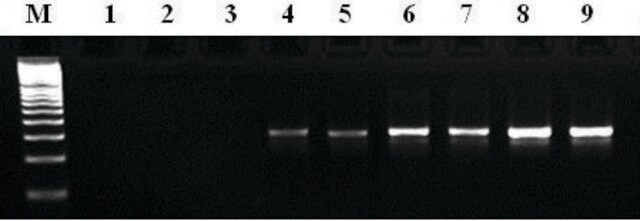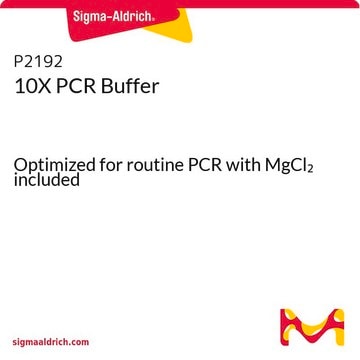M9943
10X MTP™ Taq Buffer
10X buffer, free of DNA contaminants; use with MTP Taq DNA Polymerase
About This Item
Recommended Products
Related Categories
General description
Application
- for the amplification of bacterial 16s rRNA genes from purified DNA
- to amplify archaeal 16s rRNA
- along with MTP Taq DNA polymerase (D7442) to amplify specific bacterial 16s rRNA genes from purified DNA
Legal Information
Storage Class Code
12 - Non Combustible Liquids
WGK
WGK 1
Flash Point(F)
Not applicable
Flash Point(C)
Not applicable
Certificates of Analysis (COA)
Search for Certificates of Analysis (COA) by entering the products Lot/Batch Number. Lot and Batch Numbers can be found on a product’s label following the words ‘Lot’ or ‘Batch’.
Already Own This Product?
Find documentation for the products that you have recently purchased in the Document Library.
Customers Also Viewed
Protocols
MTP™ Taq DNA Polymerase is a recombinant thermostable enzyme from Thermus aquaticus expressed in E. coli and purified using a proprietary process to minimize levels of contaminating DNA.
MTP™ Taq DNA Polymerase is a recombinant thermostable enzyme from Thermus aquaticus expressed in E. coli and purified using a proprietary process to minimize levels of contaminating DNA.
MTP™ Taq DNA Polymerase is a recombinant thermostable enzyme from Thermus aquaticus expressed in E. coli and purified using a proprietary process to minimize levels of contaminating DNA.
MTP™ Taq DNA Polymerase is a recombinant thermostable enzyme from Thermus aquaticus expressed in E. coli and purified using a proprietary process to minimize levels of contaminating DNA.
Our team of scientists has experience in all areas of research including Life Science, Material Science, Chemical Synthesis, Chromatography, Analytical and many others.
Contact Technical Service











